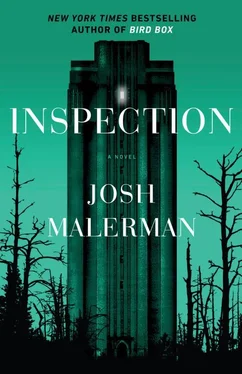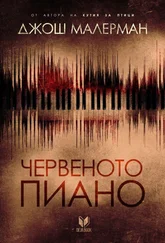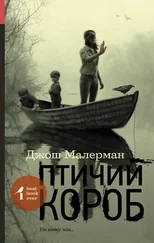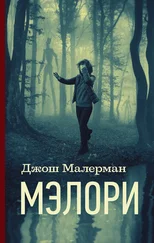Genius Is Distracted by the Opposite Sex
So what do you do?
Cast the opposite sex out.
And…
…watch…
…the…
…genius…
…sprout .
Do you remember what progress smelled like, Richard? It was as sweet as childhood, yeah?
Yeah.
Do you smell it still?
He fixed himself a second drink, let the alcohol do its job, and recalled the Basic Years.
We could live forever like this! he used to think. As he fell asleep. As he woke. Forever perfect .
Forevolution.
He poured a third drink, could hear Burt advising him to make the Turret dry. No booze around the boys, four of who were no doubt stretching their legs, taking a break between studies, bonding, exploring, growing.
Q, D, L, and J.
Richard carried the drink to the window. Drinking this heavily often led to evaluating his boys, his prized possessions, his masterpiece. And in doing so, two names, two letters, an omen he wanted desperately to avoid, invariably came up. As though someone other than himself had stolen two especially shimmering trophies from the case.
A and Z.
Richard closed his eyes. Wobbling a bit before the glass, he focused on the music, found balance there. The deep tubas mimicked the shadows in the basement that pooled by the Corner’s door. The flutes cried out like children behind it.
A had gone to the Corner.
Richard had sent him.
He opened his eyes to see that the snow had increased outside. He thought maybe he saw the form of the four boys, perhaps just one of them, walking the line of pines.
But no. Only the branches, swaying in the growing wind.
A was the first to die. A was the first letter of the alphabet. How terribly fitting. The perfectly lit match to set a paranoid man’s paper mind aflame…
The boys would die, one by one, following A, in suit, in order, B, C, D, E…
Richard laughed. It was harsh, nervous laughter, which grated against the gorgeous music that no longer carried a tune for him.
The Delicate Years…
No. The other boys were still here. The other boys hadn’t died, and no, they wouldn’t. So long as they weren’t spoiled. Spoiled rotten. And wasn’t that all there was to it? The experiment held so long as the Parenthood’s singular, irrefutable law was upheld.
A man spends all his time building something, Burt once wrote, and that object becomes his everything. His reward, yes, but his panic, his horror, too.
Of course, A hadn’t done anything wrong. A hadn’t done anything at all.
F’s mother did.
A recalcitrant whore. A weeping, second-guessing woman . A fool who let her heart best her mind until she broke the deal she’d made with the Parenthood.
She’d shown up.
Here.
At the Turret.
Richard had been out in the Yard that day, the very same expanse of grass he overlooked now, his third martini sloppily dripping gin to the floor. He’d overseen the disassembly of the enormous Glasgow Plexiglas crib. The boys had outgrown it. The carpenters (ex-cons, all) were carrying the pieces back to the tower when Richard’s placid, proud mood was interrupted by a sound he hadn’t heard in a very long time.
A piercing shriek. A falsetto of pain.
A woman.
She looked terrible, stumbling by the tower’s first-floor windows. A cuckoo wretch. Her clothes hung from her body as though she’d escaped from a hospital and had come running…running here…
The carpenters were upon her before Richard could speak. But Richard spoke.
Cover her mouth, he said calmly, crossing the Yard, already seeing the Corner door closing on her like a coffin lid.
The sky felt too big above him. The windows of the Turret too clean. Sudden sweat soaked the edges of his hair and beads dripped down to his black beard, blue in the summer sun.
At first, upon reaching her, he said nothing. He only stared into her heartbroken eyes: a mother who’d realized how much motherhood meant to her after all. Later that night, one carpenter told another he thought Richard was going to bite her. But Richard didn’t bite her. He did worse.
Go to the Corner, he’d said to her. As if she knew what that room was. As if she had any idea about the door in the basement of the building that harbored her son, the boy she’d come to retrieve. YOU GO TO THE CORNER RIGHT NOW!
The carpenters had made to move, to drag her inside, when Gordon, always present, always a witness, gasped so audibly it rivaled the mother’s lunatic shriek.
Already knowing what was wrong, what had caused his assistant to cry out, but not yet wanting to believe it, Richard turned to where Gordon was pointing a shaking manicured finger.
A boy stood with his face and hands pressed to the first-floor hall glass.
He was looking right at them.
Right at her.
Her.
“It’s A,” Gordon said, trembling.
A at the window. F’s mother in the clutches of the carpenters.
Richard felt the strength flow from his legs. But he did not fall.
Parenthood law was the one and only.
You can’t raise a truly blind man who has already seen the sky.
He’ll remember…he’ll remember…he’ll always remember…and he’ll ask about her…her…HER.
Richard walked past the carpenters, past the mother who had unknowingly sentenced somebody else’s son.
He entered the tower.
He went to the boy and knelt.
He held A’s face in his fingers.
The woman you saw, he said, has spoiled you rotten.
The Corner.
The only room in the Parenthood the boys were raised to fear. A place that existed before even their nurseries were complete. Somewhere in the basement maze not far from where Lawrence Luxley wrote the books they loved; a door at the end of a cobblestone basement corridor; the place where the noises of the night were made.
Over the years, Richard had noted small rips at the shoulders of the uniforms worn by his staff. He knew the fabric had been torn on the stones across the hall from the Corner, as the ex-cons attempted to stay as far away as they could.
The Corner.
An appellation that seemed to reach out into the hall. A door with fingers. And reach.
The Corner.
Where A and F’s mother went.
Together.
“That’s enough,” Richard said now, draining his third martini. “Time to—”
But his sentiment was cut short at the sight of the four boys returning from the Orchard. Snow had painted the shoulders of their new coats white. Their smiles underscored the laughter he heard through the glass, through the snow, through the distance.
Richard smiled, too. Four of his boys, his boys, twelve years old now, returning from a break in their studies. But as they continued to laugh, as they carried on in the way he’d once envisioned they would…as Q, D, L, and J presented the perfectly proud picture of all that Richard imagined they could be, he felt something sour spinning in his gut. A loose screw in his heart.
“What are you laughing at?” he asked them, clinking his glass quietly against the window, in rhythm with his words. “Be…good…boys…now. Tell your D.A.D…. what are you laughing at? ”
And the boys, reaching the Yard, only saw the snowfall reflected in the glass of the quarters belonging to their D.A.D., a new winter upon them.
On their walk, the boys talked about many things. But J’s mind continued to return to the discrepancy between what D.A.D. had told him in the Inspection and what he’d said during his speech.
Why did it matter so much? Plenty of Alphabet Boys had slipped up, forgotten something said, put something a different way, or simply intentionally delivered a small harmless lie. J had done it himself. With the cherry juice on the carpet. Or how about the thousand times he’d pretended to understand a joke just because the others obviously did? Was that a lie? And if one of those boys had asked him to explain what was so funny about the very joke they were laughing at, how would he have responded? Would he have been caught in a lie?
Читать дальше


![Джош Рейнольдс - Тень в пламени [Сборник]](/books/28154/dzhosh-rejnolds-ten-v-plameni-sbornik-thumb.webp)





![Джош Малерман - Мэлори [litres]](/books/388628/dzhosh-malerman-melori-litres-thumb.webp)



